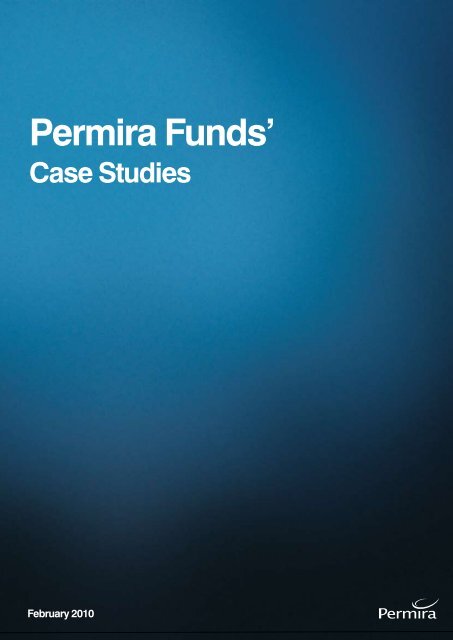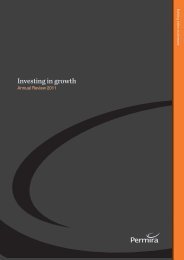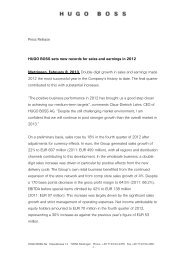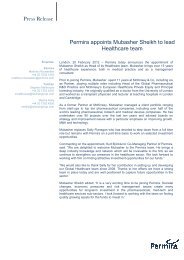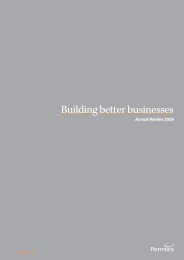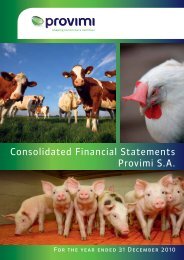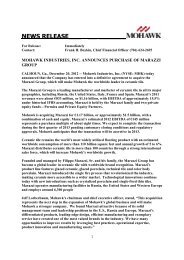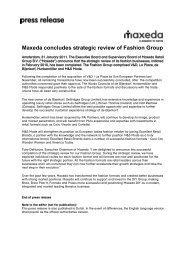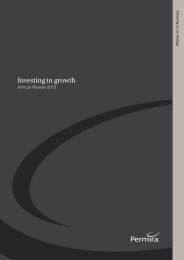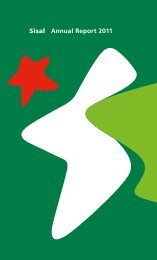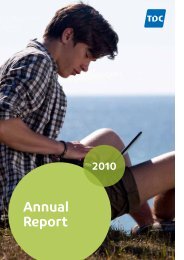Permira Funds'
Permira Funds'
Permira Funds'
You also want an ePaper? Increase the reach of your titles
YUMPU automatically turns print PDFs into web optimized ePapers that Google loves.
<strong>Permira</strong> Funds’<br />
Case CASE Studies STUDIES<br />
FEBRUARY 2010<br />
February 2010<br />
February 2010
Contents<br />
CONTENTS<br />
Contents<br />
01-02 Homebase<br />
01 - 02 Homebase<br />
03 - 04 Inmarsat<br />
05 - 06 debitel<br />
03-04 Inmarsat<br />
05-06 debitel<br />
07-08 Jet Aviation<br />
09-10 NDS<br />
07 - 08 Jet Aviation<br />
09 - 10 NDS
Realisation 2002: Homebase<br />
01<br />
+<br />
+<br />
Second largest home<br />
improvement retailer in the UK<br />
Unique acquisition carried out<br />
with corporate partners<br />
Value creation plan<br />
underpinned by strategic<br />
change in the business:<br />
introduction of new ranges and<br />
store formats, carried out by<br />
new management<br />
Exit to corporate buyer resulting<br />
in a 6.1x multiple<br />
<strong>Permira</strong> Funds’ Case Study
02<br />
Realisation 2002: Homebase<br />
Homebase<br />
www.homebase.co.uk<br />
Homebase is the UK’s<br />
second largest home improvement retailer and is<br />
recognised for choice, style and customer service across<br />
the home enhancement market. It has more than 300<br />
stores throughout the UK and Republic of Ireland, and<br />
sells over 30,000 products to more than 70 million<br />
customers per year.<br />
Sector<br />
Consumer (Retail)<br />
Origin<br />
Corporate<br />
Employees<br />
17,000<br />
In March 2001, Homebase was acquired by a<br />
company backed by the <strong>Permira</strong> funds from one<br />
of the UK’s largest supermarket chains,<br />
J Sainsbury plc.<br />
Unique acquisition process – Completing the<br />
investment in Homebase required a unique<br />
bidding approach. <strong>Permira</strong>’s investment<br />
professionals worked in partnership with J<br />
Sainsbury and another retailer, Kingfisher, to<br />
divide up the business’ property portfolio so that<br />
the <strong>Permira</strong> funds were left with a more targeted<br />
store network. The goal was to allow Homebase<br />
to refocus as a local, high-quality decorating and<br />
furnishings business.<br />
streamlined; its online offering rationalised; direct<br />
sourcing from Asia accelerated; and product<br />
availability improved.<br />
Performance improvement – This activity led<br />
to a significant improvement in Homebase’s<br />
performance. Sales rose from £1,274 million in<br />
March 2001, when the <strong>Permira</strong> funds acquired the<br />
business, to £1,380 million in December 2002, a<br />
like-for-like sales growth of 17.6%. When the<br />
business was sold to another retailer, GUS plc,<br />
the <strong>Permira</strong> funds received £762 million, which<br />
represented a 6.1x multiple and an IRR of 204%.<br />
Ownership<br />
Majority<br />
Date of Investment<br />
March<br />
2001<br />
Date of Realisation<br />
December<br />
2002<br />
<strong>Permira</strong> Contacts<br />
Charles Sherwood<br />
Cheryl Potter<br />
The company’s largest ‘megastore’ sites were<br />
bought by Kingfisher, while the freeholds to the<br />
rest of the Homebase portfolio were acquired by J<br />
Sainsbury. This allowed the <strong>Permira</strong> funds to<br />
invest £401 million to acquire the operational<br />
heart of a business valued at £865 million.<br />
Strategic repositioning – The investment in<br />
Homebase was motivated by a clear growth<br />
opportunity. The goal was to develop a unique<br />
market position that would combine a focus on<br />
DIY with an extensive furnishings and decoration<br />
range – offering a ‘softer’ product range in a<br />
‘high-street-style’ store format with improved<br />
customer service. This meant a complete strategy<br />
change for Homebase, which would be required<br />
to focus on smaller stores, introduce new product<br />
ranges and install mezzanine floors to intensify<br />
the use of sales space.<br />
Sales and EBITDA (£m)<br />
2001 - 2002<br />
1,274<br />
1,380<br />
A new management team was appointed to drive<br />
this vision, with seven of the nine members of the<br />
executive board replaced, including the chairman,<br />
chief executive and chief financial officer. Costs at<br />
the company’s HQ were reduced; product ranges<br />
74<br />
122<br />
03 / 2001 12 / 2002<br />
Sales EBITDA<br />
(Source: <strong>Permira</strong>)<br />
<strong>Permira</strong> Funds’ Case Study
Realisation 2005: Inmarsat<br />
03<br />
+<br />
+<br />
Leading provider of global<br />
mobile satellite<br />
communications services<br />
Complex acquisition process,<br />
facilitated by strong relationships<br />
with disparate shareholder base<br />
Value creation driven by<br />
significant capex – $1.5 billion<br />
invested in new satellite platforms<br />
Successful IPO delivering 3.6 x<br />
investment cost; shares continue<br />
to trade very well<br />
<strong>Permira</strong> Funds’ Case Study
04<br />
Realisation 2005: Inmarsat<br />
Inmarsat<br />
www.inmarsat.com<br />
Inmarsat is a leading<br />
provider of global mobile satellite communications<br />
services (“MSS”) and has been designing, implementing<br />
and operating satellite networks for 30 years. The<br />
company was established by the International Maritime<br />
Organization as the first provider of MSS, initially to offer<br />
communications and safety services to ships at sea.<br />
Based in London, the company today operates a fleet of<br />
11 geostationary satellites, covering 36,000 km of the<br />
earth’s surface.<br />
In December 2003, a company backed by the<br />
<strong>Permira</strong> funds, another financial investor, and the<br />
strategic shareholders Telenor and Lockheed,<br />
acquired Inmarsat Ventures plc. At the time of<br />
acquisition the business was the number one<br />
player in a stable and growing market, with a<br />
strong reputation for technical excellence and<br />
identifiable growth in the mobile broadband<br />
market. However, the business had suffered<br />
from a fragmented ownership structure which<br />
inhibited its ability to grow.<br />
Complex acquisition – <strong>Permira</strong> took time to<br />
understand Inmarsat, building relationships with<br />
the 83 corporates and government entities that<br />
constituted the shareholder base, so that the<br />
disparate motivations of the company’s owners<br />
could be identified. These discussions were led<br />
by <strong>Permira</strong>’s Stockholm office, which worked<br />
closely with Telenor, one of Inmarsat’s largest<br />
shareholders. By reaching agreements with the<br />
key corporate shareholders – KPN, Deutsche<br />
Telekom and Telenor – <strong>Permira</strong> were able to<br />
conclude the transaction while offering a price<br />
that was not the highest on the table. Ultimately<br />
the strong relationships of trust that were built<br />
with the owners of Inmarsat allowed the<br />
transaction to be completed.<br />
World class management – Following<br />
acquisition, <strong>Permira</strong>’s investment team worked<br />
with the company to put in place a clear and<br />
ambitious value creation plan, appointing a new<br />
management team with the skills and ability to<br />
drive the plan forward. Andrew Sukawaty, the<br />
former CEO of Sprint PCS, was appointed as<br />
chief executive and chairman, while a new chief<br />
financial officer was appointed from a News<br />
Corporation subsidiary NDS (a company that<br />
would later join the <strong>Permira</strong> funds’ portfolio).<br />
<strong>Permira</strong> Funds’ Case Study<br />
Investing in technology – Central to the<br />
management team’s growth plans for Inmarsat<br />
was a substantial capital expenditure<br />
programme. $1.5 billion was invested in the<br />
design, launch and manufacture of the I-4 range<br />
of satellites – the most advanced commercial<br />
mobile communications spacecraft of their kind.<br />
Alongside the capital investment programme,<br />
Inmarsat’s management team implemented a<br />
cost reduction plan and also completed a<br />
sale-and-leaseback on its London<br />
headquarters.<br />
Performance improvement – As a result of its<br />
investment programme, Inmarsat demonstrated<br />
a significant improvement in performance. After<br />
an initial decline (driven by a one-off fall in<br />
non-recurring revenue), sales and EBITDA both<br />
began to rise, while the launch of the first I-4<br />
satellite in 2005 cemented the company’s<br />
market leading position.<br />
In March 2006 the <strong>Permira</strong> funds completed the<br />
sale of their holding in Inmarsat, following an IPO<br />
in June 2005. In total, the <strong>Permira</strong> funds realised<br />
€537 million from the investment, representing<br />
an IRR of 121% and a 3.6x multiple. Today<br />
Inmarsat continues to thrive. Its shares have<br />
consistently outperformed the market and the<br />
business is now a member of London’s ‘blue<br />
chip’ FTSE 100 index.<br />
Inmarsat’s performance demonstrates the<br />
strength of the <strong>Permira</strong> approach: strong local<br />
networks and sector expertise.<br />
Sector<br />
TMT (Telecoms)<br />
Origin<br />
Corporate<br />
Employees<br />
600<br />
Ownership<br />
Majority<br />
Date of Investment<br />
December<br />
2003<br />
Date of Realisation<br />
June<br />
2005<br />
<strong>Permira</strong> Contacts<br />
Carl Parker<br />
Richard Sanders<br />
Sales and EBITDA (€m)<br />
2003 - 2005<br />
505<br />
337<br />
52<br />
2003 2004*<br />
Sales<br />
481<br />
302<br />
EBITDA<br />
(Source: <strong>Permira</strong>)<br />
491<br />
317<br />
2005<br />
*Decline in sales attributable<br />
to high levels of non-recurring<br />
revenue in 2003
Realisations 2008: debitel<br />
05<br />
+<br />
+<br />
Mobile phone services<br />
provider acquired in 2004<br />
from corporate seller. Grew<br />
substantially under <strong>Permira</strong><br />
funds’ ownership<br />
Value creation plan based<br />
on strategic repositioning and<br />
growth though acquisition<br />
Substantial sales and<br />
EBITDA improvements<br />
Sold to synergistic corporate<br />
buyer in 2008, generating 3.1 x<br />
investment cost<br />
<strong>Permira</strong> Funds’ Case Study
06<br />
Realisations 2008: debitel<br />
debitel<br />
www.debitel.com<br />
debitel is a mobile phone<br />
services provider based in Germany. The company serves<br />
over 14 million customers and is the number one<br />
distribution platform for mobile phones in Germany. The<br />
company offers a wide range of telecommunication<br />
products, including mobile and fixed-line telephony as well<br />
as internet services.<br />
Sector<br />
TMT (Telecoms)<br />
Origin<br />
Corporate<br />
Employees<br />
3,700<br />
Ownership<br />
Majority<br />
debitel covers all German operators (T-Mobile,<br />
Vodafone, eplus and O 2<br />
) and has a number of<br />
exclusive relationships with German retailers.<br />
debitel operates a retail network of more than<br />
6,000 sites in Germany alone.<br />
debitel was acquired by a company backed by<br />
PE3 from Swisscom in June 2004. The value<br />
creation was based on three major levers:<br />
Restructuring and cost leadership - debitel<br />
came out of a period of uncertainty, with a failed<br />
participation in the German UMTS auction, a<br />
poor operational situation with many<br />
loss-making divisions and unstable<br />
relationships with its partners. After the<br />
investment by the <strong>Permira</strong> funds, debitel<br />
re-established reliable long-term partnerships<br />
with its key business partners, i.e. mobile<br />
network operators as well as large retailers.<br />
In parallel, significant cost reduction was<br />
implemented through the establishment of the<br />
programme office. This programme office<br />
implemented three far-reaching operational<br />
improvement programmes resulting in an<br />
annual EBITDA contribution of €160 million in<br />
2008. To drive this, a ‘best in the industry’<br />
management team was introduced.<br />
Focus and evolution of business model – a<br />
strong regional focus was placed on the<br />
German core market with the sale of debitel’s<br />
international sub-scale subsidiaries in Demark,<br />
France and Slovenia. At the same time, the<br />
company improved its business model in<br />
Germany by instituting higher margin contracts<br />
with features typical of mobile virtual network<br />
operators and broadening the product.<br />
spectrum through the inclusion of DSL and<br />
original MNO-products<br />
Consolidation and market leadership - the<br />
company actively drove the consolidation of the<br />
German mobile telephony market. The<br />
acquisition of ‘_dug’, the largest independent<br />
retailer of mobile telephony products in<br />
Germany, was key to growing debitel’s retail<br />
chain from around 80 at the time of the initial<br />
investment to more than 500 owned outlets by<br />
2008. This growth allowed debitel to reduce<br />
significantly its dependence on indirect<br />
distribution channels. In July 2007, debitel<br />
acquired Talkline, the third largest mobile<br />
service provider, giving debitel 3.8 million<br />
additional customers. As a result debitel<br />
achieved market leadership, becoming the<br />
number one distribution platform of mobile<br />
phone services in Germany, ahead of Vodafone<br />
and T-Mobile. The full integration of<br />
Talkline, _dug and debitel is expected to deliver<br />
another €100 million of savings, which will<br />
contribute strongly to the high cashflow<br />
performance of the company.<br />
After becoming the clear market leader in<br />
the German mobile market, debitel attracted the<br />
interest of the Freenet Group, which was the<br />
second largest mobile service provider at that<br />
time. Following the clear industrial logic of<br />
continued market consolidation, debitel was<br />
sold to Freenet in July 2008. The investment<br />
generated 3.1 x investment cost.<br />
Date of Investment<br />
June<br />
2004<br />
Date of Realisation<br />
July<br />
2008<br />
<strong>Permira</strong> Contacts<br />
Jörg Rockenhäuser<br />
Martin Fark<br />
Sales and EBITDA (€m)<br />
2005 - 2007<br />
2,726<br />
172<br />
2,616<br />
160<br />
3,696<br />
255<br />
2005 2006<br />
2007<br />
Sales<br />
EBITDA<br />
(Source: <strong>Permira</strong>)<br />
2007 figures proforma for acquisitions /<br />
realisations<br />
<strong>Permira</strong> Funds’ Case Study
Realisations 2008: Jet Aviation<br />
07<br />
+<br />
+<br />
Transformed Swiss-centric<br />
family company into a global<br />
leader for business aviation<br />
Value creation plan based on<br />
investing significant capital<br />
to support growth<br />
Acquisitions and alliances<br />
supported expansion into<br />
the US, Russia and China<br />
Improved performance:<br />
substantial increase in sales<br />
and EBITDA<br />
Sold to a trade buyer to deliver<br />
3.9 x investment cost and an<br />
IRR of 57%<br />
<strong>Permira</strong> Funds’ Case Study
08<br />
Realisations 2008: Jet Aviation<br />
Jet Aviation<br />
www.jetaviation.com<br />
Jet Aviation (“Jet”)<br />
is a Swiss-based international business aviation<br />
services company. The company provides<br />
service, completions and refurbishment,<br />
engineering and fixed base operations,<br />
along with related aircraft management and<br />
charter services.<br />
Sector<br />
Industrials<br />
Origin<br />
Family Owner<br />
Employees<br />
5,600<br />
In October 2005, after a three-year origination<br />
process, a company backed by PE3 acquired<br />
Jet from the company’s founding family.<br />
Following acquisition, the <strong>Permira</strong> funds backed<br />
an ambitious value creation plan, transforming a<br />
Swiss-centric family company into a global<br />
leader for business aviation services. The<br />
<strong>Permira</strong> funds helped Jet become more focused<br />
and efficient, establish a world class<br />
management team and invest significant capital<br />
to support growth. Carl Hirschmann, a member<br />
of the family that founded Jet (and a minority<br />
investor alongside the <strong>Permira</strong> funds), explains:<br />
“The <strong>Permira</strong> funds allowed Jet to grow at a<br />
speed and with a determination which we could<br />
not have managed as a family-owned company.<br />
Furthermore, <strong>Permira</strong> supported the<br />
professionalisation of the business as a key<br />
enabler for the rapid expansion.”<br />
Immediately following acquisition, a programme<br />
office was established that focused on<br />
industrialisation and scalability of existing<br />
processes in the organisation, adding €35<br />
million to EBITDA after only two years. To expand<br />
capacity, more than €60 million was invested in<br />
new facilities, leading to the construction of one<br />
of the largest aircraft hangars in Europe. Located<br />
at Basel’s EuroAirport, the new 9,600 square<br />
metre wide-body hangar was opened in May<br />
2008 and took just seven months to complete.<br />
acquired US-based maintenance and<br />
completions company Savannah Air Center to<br />
strengthen further Jet’s position as a full<br />
business aviation service provider in North<br />
America. In total the <strong>Permira</strong> funds backed an<br />
investment of US$300m in Jet’s US business.<br />
Throughout its period in the <strong>Permira</strong> funds’<br />
portfolio, Jet expanded into new fast-growing<br />
markets. The company set up line maintenance<br />
operations in Moscow’s Vnukovo International<br />
Airport and moved forward with plans to open<br />
new facilities at Beijing’s Capital International<br />
Airport in partnership with Beijing-based<br />
Deer Air.<br />
On a reported basis, sales grew at a CAGR<br />
of 25% from 2005 to 2007 and the value of the<br />
order pipeline at Jet increased from €50 million<br />
at the date of the fund’s investment to €1.2 billion<br />
by June 2008. The company’s workforce also<br />
grew by 70% to around 5,600 employees. Jet is<br />
now one of the leading business aviation<br />
services companies in the world.<br />
In August 2008, despite the global economic<br />
downturn, it was announced that Jet was to be<br />
acquired by global defence and aviation group<br />
General Dynamics. The sale was completed just<br />
days after the collapse of Lehman Brothers. The<br />
<strong>Permira</strong> funds realised 3.9 x investment cost and<br />
an IRR of 57%.<br />
Ownership<br />
Majority<br />
Date of Investment<br />
October<br />
2005<br />
Date of Realisation<br />
November<br />
2008<br />
<strong>Permira</strong> Contacts<br />
Jörg Rockenhäuser<br />
Torsten Vogt<br />
Sales and EBITDA (€m)<br />
2005 - 2007<br />
Jet also expanded by making strategic<br />
acquisitions. In March 2006, it acquired<br />
Midcoast, a US-based aircraft maintenance and<br />
modification company, which expanded<br />
significantly the company’s presence in North<br />
America. More recently, in January 2008, Jet<br />
The sale of Jet shows the resilience of demand<br />
from trade buyers for strategically important<br />
assets, especially when the impact of<br />
operational change has been to transform the<br />
asset’s performance and market position.<br />
502<br />
56<br />
685<br />
83<br />
2005 2006<br />
787<br />
2007<br />
103<br />
Sales<br />
EBITDA<br />
(Source: <strong>Permira</strong>)<br />
<strong>Permira</strong> Funds’ Case Study
New Investment: NDS 2009<br />
09<br />
+<br />
+<br />
Leading provider of media<br />
content security technologies<br />
Acquired in partnership with<br />
News Corporation in February<br />
2009 in proprietary process<br />
Strong growth performance<br />
sustained since acquisition a<br />
year ago<br />
Value creation plan based<br />
around further international<br />
expansion in emerging<br />
markets, the strengthening of<br />
its presence in the cable<br />
market and new product<br />
innovation<br />
<strong>Permira</strong> Funds’ Case Study
10<br />
New Investment: NDS 2009<br />
NDS<br />
www.nds.com<br />
NDS is a leading<br />
provider of media content security, enabling<br />
technologies and interactive applications for<br />
pay-TV operators. NDS protects US$40 billion of<br />
pay-TV revenues worldwide and enjoys<br />
longstanding relationships with leading pay-TV<br />
operators such as DirecTV, BSkyB, Sky Italia, Tata<br />
Sky, Canal+, Sky Deutschland and Viasat.<br />
NDS was acquired in a public-to-private<br />
transaction in January 2009 by a company<br />
backed by <strong>Permira</strong> IV. The acquisition was done in<br />
partnership with the international media group<br />
News Corporation, the original owner of NDS,<br />
which retains a significant interest in the business.<br />
As a result of the acquisition NDS was delisted<br />
from Nasdaq.<br />
A market leader - NDS creates technologies<br />
and applications that enable pay-TV operators to<br />
securely deliver digital content to TV set-top<br />
boxes, digital video recorders (DVRs), personal<br />
computers, mobile phones and other multimedia<br />
devices. The company’s key technologies include<br />
the world’s market-leading conditional access<br />
and digital rights management technology,<br />
market-leading setup box operating systems,<br />
DVRs and electronic programme guides. Today,<br />
over 70 of the world’s leading pay-TV platforms<br />
rely on NDS solutions to protect and enhance their<br />
businesses. Research and development is key for<br />
the company to maintain its market-leading<br />
positioning and continue to develop innovative<br />
technologies for its customers. The business is<br />
totally committed to uphold its track record of<br />
innovation and over 75% of NDS’ workforce is<br />
dedicated to ongoing research and development<br />
work in its offices around the world today.<br />
A proprietary investment - The investment in<br />
NDS was originated by <strong>Permira</strong>’s media and<br />
technology team on a proprietary basis. The team<br />
had been following the set-top box industry for<br />
many years and was particularly interested in the<br />
software end, a fast growing and very profitable<br />
niche in the market. The team had reviewed most<br />
of the companies competing in that space over<br />
time and NDS was identified early as a clear<br />
outperformer. In addition the team’s extensive<br />
industry network meant that they knew the<br />
ex-CFO of the business well, as they had worked<br />
with him on another successful TMT investment in<br />
the satellite business Inmarsat. The team also had<br />
<strong>Permira</strong> Funds’ Case Study<br />
strong relationships with News Corporation. This<br />
in-depth industry expertise combined with the<br />
team’s extensive industry network clearly<br />
positioned <strong>Permira</strong> as a natural potential acquirer<br />
of the business when News Corp. decided to sell<br />
a majority stake in the business in 2008.<br />
A corporate partnership - The <strong>Permira</strong> funds<br />
have a long history of partnering with families,<br />
corporates and management teams to invest in<br />
and build better businesses. It was <strong>Permira</strong>’s long<br />
standing relationship with News Corp. and their<br />
shared vision for NDS and its growth prospects<br />
that initiated the exclusive acquisition talks. The<br />
<strong>Permira</strong> team’s experience of governance<br />
structures suitable to corporate partners<br />
ultimately made this investment compelling for all<br />
parties.<br />
A strategy to create value - NDS has<br />
continued to perform strongly over the past 12<br />
months since acquisition despite a difficult<br />
economic backdrop. During this time the<br />
business has made considerable progress on<br />
executing its expansion into emerging markets,<br />
particularly China and India. Today, the<br />
management team, with <strong>Permira</strong>’s support, is fully<br />
focused on continuing to grow the business.<br />
International expansion is well underway with NDS<br />
actively seeking new contracts for its existing<br />
technologies in fast growing emerging markets. It<br />
is also working hard on reinforcing its position in<br />
the US and European cable market segments by<br />
providing value added services designed to<br />
improve the customer experience including better<br />
user interface, user-friendly programme guides<br />
and multi-room DVR facilities. Finally, NDS is<br />
committed to maintaining its innovative edge and<br />
focused on strengthening its existing client<br />
relationships by creating the applications and<br />
technology of the future such as targeted<br />
advertising technology for DVRs .<br />
Sector<br />
TMT (Technology)<br />
Origin<br />
Corporate<br />
Employees<br />
4,270<br />
Ownership<br />
Majority<br />
Date of Investment<br />
January<br />
2009<br />
<strong>Permira</strong> Contacts<br />
Damon Buffini<br />
Richard Sanders<br />
Benoit Vauchy<br />
Alex Margoline<br />
Sales and adjusted EBITDA<br />
(US$m) Q3 2009 vs Q3 2010 (F)<br />
187<br />
52<br />
Q3 - 2009<br />
Sales<br />
222<br />
65<br />
Q3 - 2010 (F)<br />
Adjusted EBITDA<br />
Q3: January to March period<br />
(Source: <strong>Permira</strong>)


